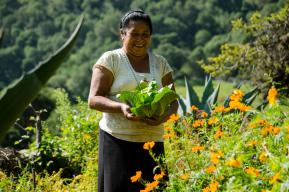The diversity of cultural expressions is an extraordinary opportunity to understand how biodiversity is perceived across the globe, learn from each other and to imagine solutions. This IPBES assessment report on values is an important step towards this goal, to understand and change the way we relate to nature. Making peace with nature is a matter of behavioral change, ethics and values. Reconciliation is already happening in UNESCO sites across the globe, and these new relationships can be shared with the world. For this, we believe in the power of social and human sciences and education.

The assessment unveils important findings. It reveals that decision-making processes that support representation and consideration of diverse values and integrate indigenous and local knowledge with scientific knowledge have more just and sustainable social and ecological outcomes. These processes include the design and management of protected areas. The assessment highlights examples where prioritizing local values, including in the co-management of protected areas, has resulted in increased forest cover and species populations, better livelihoods and less poverty.
The IPBES Values Assessment was prepared over four years by 82 leading experts from 47 countries . It draws on more than 13,000 references to present nature's diverse values and different approaches to valuing nature's contributions to people. The assessment offers options for choosing and designing appropriate valuation methods and approaches. It also explores ways to address conflicts caused by different perspectives on values and the valuation of nature.
What do we mean by values?
The way in which people value and perceive biodiversity influences human behaviour not only at the level of the individual but also at the level of institutions and entire societies. An individual’s perception of biodiversity depends on their culture, gender, education, occupation, context (e.g., urban/rural) and/or a multitude of other influences.
Biodiversity may be valued for the extrinsic ‘ecosystem services’ it provides to humanity, such as the provision of pollinators like bees for food production, the role that mangroves play in preventing coastal erosion or that plants play as potential sources of new pharmaceuticals.
Biodiversity may also be regarded as having intrinsic value; for example, highly biodiverse areas such as rainforests or coral reefs, or charismatic animals such as tigers or whales, are often perceived of value regardless of their contributions to people.
Biodiversity and nature also have profound cultural and spiritual dimensions. However, these may conflict with systems that place an economic value on biodiversity.
To achieve the United Nations’ Sustainable Development Goals to 2030, participatory approaches that reconcile different worldviews can help balance individualistic values such as the quest for short-term profit with shared values that foster collective wellbeing, such as caring, stewardship, and reciprocity, which are prevalent in many indigenous cultures. These approaches can help to address the misalignment between priorities for managing nature at government level and priorities at other organizational levels.
The assessment also highlights the role of environmental education and awareness-raising, for example using social media, which can motivate behaviour change in the short- to medium-terms by incorporating nature’s values into decision-making.
Values throughout the World Network of Biosphere Reserves
UNESCO's role
As one of IPBES’ four main institutional United Nations partners, UNESCO has provided support and engagement from the very early stages of IPBES’ creation. UNESCO's Local and Indigenous Knowledge Systems programme (LINKS) hosts the Technical Support Unit for the IPBES Task Force on Indigenous and Local Knowledge Systems. UNESCO therefore played a key role in the development and implementation of methods for the assessment, including by organising a series of dialogue workshops that brought together indigenous peoples and local communities and assessment authors to discuss key themes and share knowledge related to the assessment, including how indigenous peoples and local communities conceptualise and value nature, and how they bring these values into traditional decision-making and management systems that sustain both human-wellbeing and nature. Challenges and ways forward for the continuation and revitalization of these value systems were also discussed and highlighted in the assessment.
UNESCO is the custodial organization of knowledge and know-how that is respectful of biodiversity. Through its programmes, the organization promotes the co-production of scientific, indigenous and local knowledge, as well as education for sustainable development.
Through its unique and multidisciplinary mandate within the UN system, UNESCO is strengthening its efforts and actions towards reconciling all human beings with one other and with the rest of the living world. Only a profound change in our system of values will allow us to restore our relationship with nature and to move from the dominance of economic values and economic growth towards values promoting collective well-being. This reconciliation is about taking into consideration other people’s values in our actions everywhere on the planet.
Through its programmes, UNESCO provides a unique platform fostering intergenerational dialogue and working towards understanding others people’s values to transform these values into common decisions that make our economy and social systems thrive and respectful of the living.
UNESCO-designated sites are rich in examples of good practices associated with worldviews where humans do not dominate nature, including in urban areas. These good practices take the form of homegrown solutions that we already have at our disposal in UNESCO biosphere reserves, Global Geoparks and World Heritage sites to foster collective, shared values. The same is true for elements of Intangible Cultural Heritage.
By providing decision-makers with the best-available evidence, analysis and options about embedding nature’s values in decisions about nature, the IPBES Values Assessment will support implementation of the post-2020 Global Biodiversity Framework of the Convention on Biological Diversity that is expected to be agreed in December 2022. In this way, the assessment will provide a toolkit and roadmap for meeting the Sustainable Development Goals.
UNESCO makes a unique contribution to the transformation of our world, our ways of life and economies by combining culture, science, local and indigenous knowledge for the implementation of the 2030 Agenda for Sustainable Development.
















